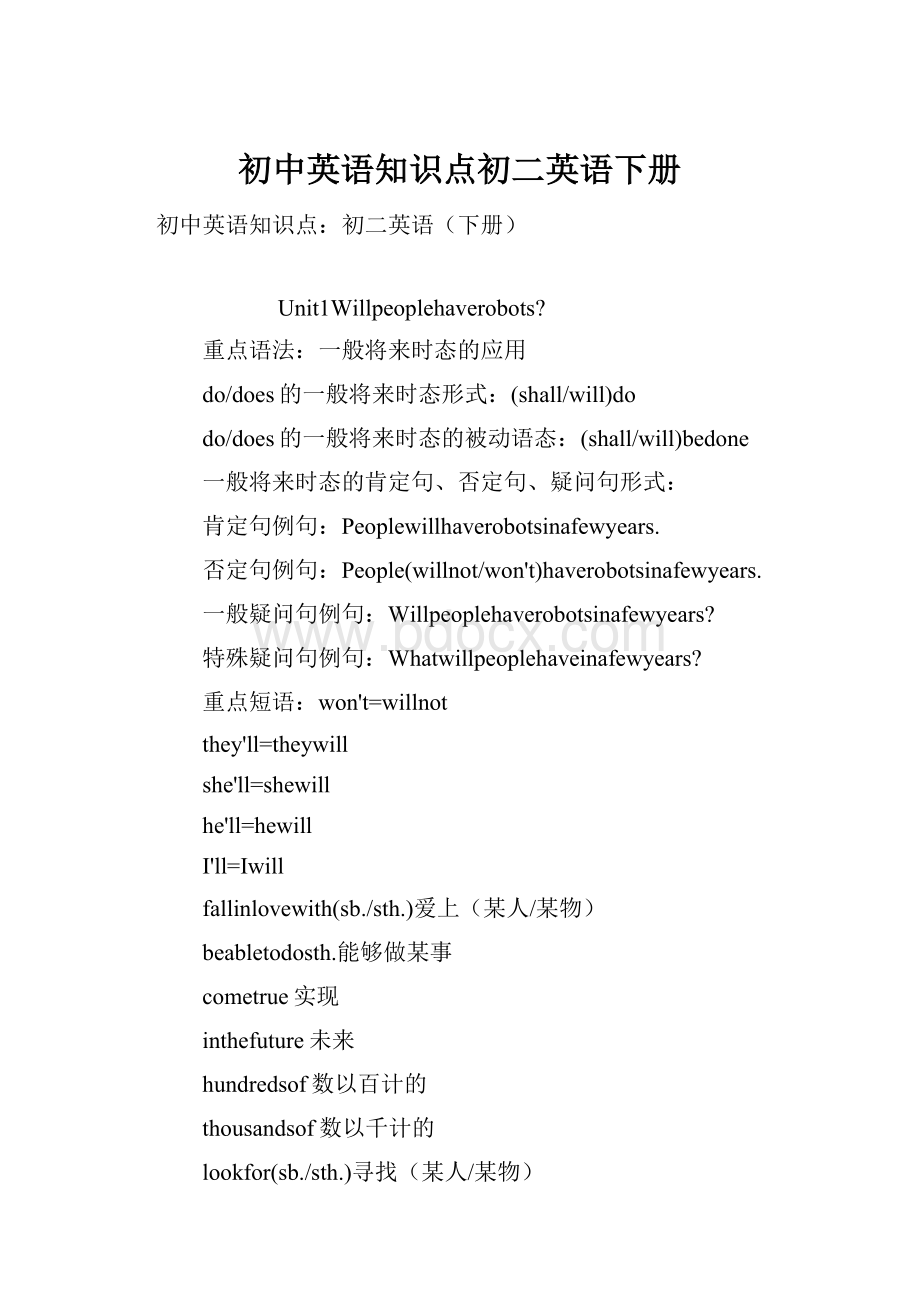初中英语知识点初二英语下册Word文档格式.docx
《初中英语知识点初二英语下册Word文档格式.docx》由会员分享,可在线阅读,更多相关《初中英语知识点初二英语下册Word文档格式.docx(16页珍藏版)》请在冰豆网上搜索。

lookfor(sb./sth.)寻找(某人/某物)
will→would情态动词will的原形和过去式
may→might情态动词may的原形和过去式
ReadingStrategy(阅读方法)
Lookatthetitleandpicture,andpredictwhatyouwillreadabout.(看着标题和图片,预知你要阅读那些方面的内容。
)Thishelpsyougetreadytoacquirenewinformation.(这样可以帮助你获得一些新的信息。
)
Unit2WhatshouldIdo?
过去将来时态(将来时态的委婉说法)
do/does的过去将来时态形式:
(should/would)do
do/does的过去将来时态的被动语态:
(should/would)bedone
过去将来时态的肯定句、否定句、疑问句形式:
Youshouldwritealettertohim.
Youshouldn'
twritealettertohim.
ShouldIwritealettertohim?
WhatshouldIdo?
keepsb.out不让某人进入
What'
swrong?
=What'
sthematter?
stheproblem?
怎么了?
outofstyle不时髦的;
过时的
callsb.up给某人打电话
payforsth.为某事付款
part-timejob兼职工作
thesameas=besame(to/with)与……同样
instyle时髦的;
流行的
geton[well]withsb.=getalong[well]withsb.与某人相处(好)
didn'
t=didnot
couldn'
t=couldnot
as...aspossible尽可能……(eg/assoonaspossible尽快)
allkindsof各种;
许多
ontheonehand一方面
ontheotherhand另一方面
asksb.forsth.=asksb.todosth.请求某人做某事
asksb.nottodosth.请求某人不要做某事
spend(money)onsth.=spend(money)[in]doingsth.花钱做某事
sth.costsb.(money)某人花钱为了某事
takesb.sometimetodosth.花某人时间做某事
findout查明
findsb.doingsth.发现某人做某事
beangrywithsb.生某人的气
beangryatsth.生某事的气
thesameageas=asoldas与某人年龄一样
havefightwithsb.与某人打架
learntodosth.学会做某事
not...until...直到……才……
comparesth.(A)withsth.(B)把某事(A)与某事(B)作比较
it'
stimeforsth.=it'
stimetodosth.到该做某事的时间了
maybeadv.或许
maybe(情态动词+动词原形)可能是
shall→should情态动词shall的原形和过去式
pay→paid→paid动词pay的原形、过去式和过去分词
Youwilllearntousenewwordsbetterifyouusealearner'
sdictionary.(时刻学着应用新单词来学习比时刻使用字典这种途径方法更好。
)Abilingualdictionarysometimesgivesthewrongmeaningforthesituationyouwant.(在某些你需要的场合下,一本双语字典有时会给你错误的解释。
Unit3WhatwereyoudoingwhentheUFOarrived?
过去进行时态
do/does的过去进行时态形式:
(was/were)doing
do/does的过去进行时态的被动语态:
(was/were)beingdone
过去将来时态的肯定句、否定句和疑问句形式:
IwaswalkingdownthestreetwhenaUFOlanded.
Iwasn'
twalkingdownthestreetwhenaUFOlanded.
WereyouwalkingdownthestreetwhenaUFOlanded?
WhatwereyoudoingwhenaUFOlanded?
动词when和while的选择:
when后加瞬间动词,while后加延续性动词。
例句:
TheboywaswalkingdownthestreetwhentheUFOlanded.
=Whiletheboywaswalkingdownthestreet,theUFOlanded.
感叹句
结构:
(1)How+adj.+the+主语+谓语动词
=
(2)What+(a/an)+[adj.]+n.+主语+谓语动词
Whatabeautifulflower[itis]!
=Howbeautifulthefloweris!
Whatbeautifulflowers[theyare]!
=Howbeautifultheflowersare!
getout出去;
离开
takeoff起飞
runaway逃跑;
跑掉
comein进来
hearabout=hearof听说
takeplace发生
as...as像……一样(eg/asoldashim像他一样老)
anywhere=everywhere=hereandthere任何地方
thinkabout考虑
thinkof认为
getup=getoutofthebed起床
atthedoctor'
s在诊所
everyday每一天
everydayadj.日常的
mostadj.大部分
themost最多的
inspace在太空中
nationalhero民族英雄
allovertheworld=intheworld全世界
Thetitlecanbehelpfulforyoutounderstandatext.(一篇文章的标题可以帮助你理解整篇文章。
)It'
salsoagoodideatoreadthefirstsentenceofeachparagraphbeforeyouread.(在阅读整篇文章之前,阅读每段的第一句话也是一个很有效的方法。
Unit4HesaidIwashard-working.
宾语从句
主语+谓语动词+宾语从句(主语+谓语动词+宾语/表语)
----I'
mgoodatEnglish.Hesays.(改为加宾语从句的复合句)
----HesaysI'
mgoodatEnglish.
注意:
①主句是一般现在时态,宾语从句的时态不受其影响。
HesaysI'
mgoodatEnglishnow.
HesaysIwasgoodatmathematicswhenIwasyoung.
②主句是过去时态,宾语从句也要用过去时态。
HesaidIwasgoodatmathematicswhenIwasyoungyesterday.
HesaidIwasgoodatEnglishnowyesterday.
③宾语从句是客观真理时永远用一般现在时态。
Ourteachersays24hoursmakeaday.
Ourteachersaidthesungivesussomanyenergyyesterday.
④动词原形不能作主语,必须用其-ing形式。
Shesaidhelpingotherschangedherlife.
directspeech直接引语
reportedspeech=indirectspeech间接引语
firstofall=atfirst首先
passon传递
besupposedtodosth.应该做某事
begoodat=dowellin在某方面做得好
ingoodhealth身体健康
getover克服
openup打开
carefor=takecareof=lookafter照料;
照顾
notanymore=notanylonger=nolonger不再
haveacold感冒
end-of-yearexam年终考试
getnervous变得紧张
forgettodosth.忘记做某事(该事未做)
forgetdoingsth.忘记做某事(该事已做)
s+adj.+[forsb.]+todosth.做某事[对某人来说]……(加形容词)
context上下文
Firstreadformeaning,notfordetail.(首先理解文段的大致意思,不在于文段的细节部分。
Youcanunderstandthemeaningofawordyoudon'
tknowfromthecontext.(至于不懂的单词,你可以通过上下文来寻找它的正确释义。
Unit5Ifyougototheparty,you'
llhaveagreattime!
if引导的条件状语从句
主句+if+条件状语从句
if+条件状语从句+[(comma)]+主句
在if引导的条件状语从句中,主句应用将来时态,状语从句用一般现在时态。
You'
llhaveagreattimeifyougototheparty.
=Ifyougototheparty,you'
llhaveagreattime.
takeaway拿走
aroundtheworld=allovertheworld在世界各地
makealiving谋生
allthetime=always一直
inordertodosth.为了做某事
makesb.dosth.使得某人做某事(to省略,该结构是一个不带to的不定式。
makesb.adj.使得某人……(加形容词)
makesb.done使得某人被做
befamousfor为……而出名
befamousas作为……而出名
inclass在课堂上
spend...(time/money)onsth.=spend...(time/money)indoingsth.花……(时间/钱)用于做某事
seesb.dosth.看见某人做某事(强调整个过程)
seesb.doingsth.看见某人做某事(强调偶然性)
say→said→said动词say的原形、过去式和过去分词
tell→told→told动词tell的原形、过去式和过去分词
eat→ate→eaten动词eat的原形、过去式和过去分词
speak→spoke→spoken动词speak的原形、过去式和过去分词
Unit6Howlonghaveyoubeencollectingshells?
现在完成进行时态
do/does的现在完成进行时态形式:
have/hasbeendoing
do/does的现在完成进行时态的被动语态:
have/hasbeenbeingdone
现在完成进行时态所应用的场合:
①某事从过去发生一直持续到现在都在做
②过去发生的动作对现在造成影响
例:
我已上了三年初中。
IhavebeeninJuniorSchoolfor3years.
自从那次他与我谈过心后,我天天都在进步。
Ihavebeenmakingprogresssincehetalkedwithmethattime.
现在完成进行时态的肯定句、否定句和疑问句形式:
Ihavebeenskatingforfivehours.
Ihaven'
tbeenskatingforfivehours.
Haveyoubeenskatingforfivehours?
Howlonghaveyoubeenskating?
瞬间动词不能和一段时间连用。
你借这本书已经多长时间了?
Howlonghaveyoubeenkeepingthisbook?
runoutof用完;
用尽
bytheway顺便说说
beinterestedindoingsth.对某事感兴趣
morethan比……多
faraway在远处
wouldliketodosth.=wanttodosth.=feellikedoingsth.想要做某事
sendsb.sth.=sendsth.tosb.把某物赠送给某人
infact实际上
room房间(用于可数名词);
空间(用于不可数名词)
common→morecommon→themostcommon形容词common的原级、比较级和最高级
Letyoureyes"
scan"
thetextquicklytofinddetailsthatyou'
relookingfor.(在阅读文章之前,用眼睛“横扫”整篇文章,快速寻找你需要的文章要点。
)Youcanfindinformationquicklywithoutreadingthewholetext.(这样你就不用细读整篇文章,就能寻找到你需要的一些信息。
Unit7Wouldyoumindturningdownthemusic?
mind[one'
s]doingsth.介意(某人)做某事
notatall一点也不
turndown调节使音量变小
rightaway=inaminute=atonce立刻;
马上
waitinline排队等候
cutinline插队等候
hasn'
t=hasnot
keep...down压低声音;
使缓和
atfirst=firstofall首先
takecare当心;
小心
takecareof=careabout=lookafter关心;
breaktherule违规
obeytherule遵守规定
putout熄灭
picksth.up捡起某物
waitforsb.等候某人
dependon依赖;
依靠
getback=return要回
mean→meant→meant动词mean的原形、过去式和过去分词
Asweread,weneedtofind"
topicsentences"
.(在我们阅读的时候,我们需要寻找“主题语句”,也就是和文章中心最相关的语句。
)Thesesentencesusuallygivesusa"
summary"
oroverallmeaningofeachparagraphandhelpusunderstandwhattheparagraphisabout.(这些语句通常会给我们一些文章的“概要”,或者每个文段的全部意思,来帮助我们理解段落大意。
)Afterthetopicsentencecomesmoredetailandexplanation.(当“主题语句”出现后,该段的一些解释和细节也就会随之出现。
Unit8Whydon'
tyougetherascarf?
询问别人为什么要做或者不做某事
whydon'
tyoudosth.=whynotdosth.
Whydon'
tyougetheracamera?
=Whynotgetheracamera?
whatabout=howabout
Howaboutsometennisballs?
=Whataboutsometennisballs?
fallasleep入睡
giveaway赠送;
分发
hearof=hearabout听说
takeaninterestin=beinterestedin对……感兴趣
makefriendswith与……交友
makeprogress取得进步
keep→kept→kept动词keep的原形、过去式和过去分词
feed→fed→fed动词feed的原形、过去式和过去分词
fall→fell→fallen动词fall的原形、过去式和过去分词
hear→heard→heard动词hear的原形、过去式和过去分词
Tounderstandtheimportantideasfromthetext,wemust"
summarize"
.(为了了解文段最主要的意图,我们必须要进行总结。
)Dothisbyanswering"
who,what,where,why"
questionsasyouread.(在阅读时,常注意回答时间、地点、人物这些基本要素问题,达到总结的目的。
Unit9Haveyoueverbeentoanamusement?
现在完成时态
do/does的现在完成时态形式:
(have/has)done
do/does的现在完成时态的被动语态:
(have/has)beendone
现在完成时态主要强调过去发生的事情对现在的影响。
我去年去过美国,那是我第一次出国。
IhaveeverbeentoAmerica.It'
sthefirsttimeformetogoabroad.
haveagreattime=haveagoodtime=havefun=enjoyoneself玩得高兴
onboard在船上
endupdoingsth.结束做某事
allyearround=allovertheyear终年
understand→understood→understood动词understand的原形、过去式和过去分词
Afterreading,writedownthreeormorethingsyouhavelearned.(在阅读整篇文章之后,把你学到的三样或更多事物写下来。
)Wealwaysrememberthingsbetterifwetaketimetoreflect.(如果我们花时间去思考一些问题的话,那么我们就能更容易地记住一些事情。
Unit10It'
saniceday,isn'
tit?
反意疑问句
反意疑问句由肯定陈述句加否定问句构成,或者由否定陈述句加肯定问句构成。
He'
sastudent,isn'
the?
She'
snothismother,isshe?
回答反意疑问句时,要根据事实来回答。
若事实是肯定的,则必须用yes回答。
若事实是否定的,则必须用no回答。
你还没有准备好,对吧?
You'
renotready,areyou?
是的,我没有准备好。
No,I'
mnot.
不,我准备好了。
Yes,Iam.
lookthrough浏览
comealong出现;
发生
getalong相处
atleast至少
atmost至多
athank-younote感谢信
forget→forgot→forgotten动词forget的原形、过去式和过去分词
little→less→least形容词little的原级、比较级和最高级
many/much→more→most形容词many/much的原级、比较级和最高级
重要句型、短语。
(一)重要句型。
1.Therewillbelesspollution,moretreesandfewercarsin100years.
2.WhatshouldIdo?
Youshoulddomoreexercise.Youcouldbuysomebooks.
3.Whenthemancameintotheroom,Iwasreadingabook.
=WhileIwasreadingabook,amancameintotheroom.
4.Hesaidtheywouldcomeherein5minutesandtheywereontheway.
5.Wewilltakeyoutothezooifwehavefreetime.
6.WehavebeenstudyingEnglishfor3years.
=WehavebeenstudyingEnglishsince3yearsago.
7.Wouldyoumindclosingthewindow?
=Couldyoupleaseclosethewindow?
=Pl